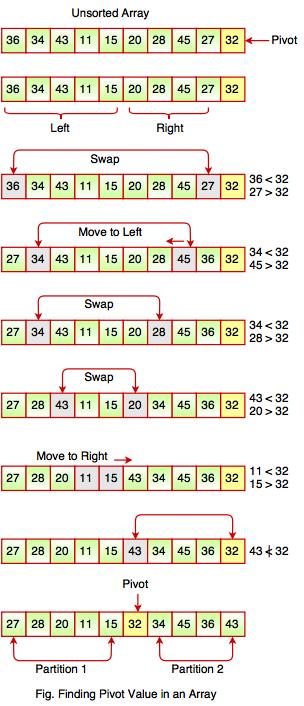




#include<stdio.h>
#include<conio.h>
//quick Sort function to Sort Integer array list
void quicksort(int array[], int firstIndex, int lastIndex)
{
//declaaring index variables
int pivotIndex, temp, index1, index2;
if(firstIndex < lastIndex)
{
//assigninh first element index as pivot element
pivotIndex = firstIndex;
index1 = firstIndex;
index2 = lastIndex;
//Sorting in Ascending order with quick sort
while(index1 < index2)
{
while(array[index1] <= array[pivotIndex] && index1 < lastIndex)
{
index1++;
}
while(array[index2]>array[pivotIndex])
{
index2--;
}
if(index1<index2)
{
//Swapping opertation
temp = array[index1];
array[index1] = array[index2];
array[index2] = temp;
}
}
//At the end of first iteration, swap pivot element with index2 element
temp = array[pivotIndex];
array[pivotIndex] = array[index2];
array[index2] = temp;
//Recursive call for quick sort, with partiontioning
quicksort(array, firstIndex, index2-1);
quicksort(array, index2+1, lastIndex);
}
}
int main()
{
//Declaring variables
int array[100],n,i;
//Number of elements in array form user input
printf("Enter the number of element you want to Sort : ");
scanf("%d",&n);
//code to ask to enter elements from user equal to n
printf("Enter Elements in the list : ");
for(i = 0; i < n; i++)
{
scanf("%d",&array[i]);
}
//calling quickSort function defined above
quicksort(array,0,n-1);
//print sorted array
printf("Sorted elements: ");
for(i=0;i<n;i++)
printf(" %d",array[i]);
getch();
return 0;
}
